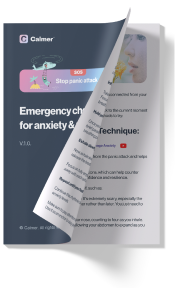Key Takeaways:
- Journaling is a simple method to reduce anxiety by writing down your thoughts, feelings, and behaviors.
- Studies have found many benefits to keeping an anxiety journal, from lower levels of depression to better memory.
- You can start an anxiety journal by choosing things like the type of notebook, when you want to write, and the daily prompts you want to follow.
Feeling anxious at times is completely natural. Got a big job interview coming up? Of course, you’ll feel stressed. Found out a loved one broke their arm? There’s no doubt you’ll be worried. However, once your interview is over and you know you’ve secured the job or you’ve visited your loved one and they’re fine, the anxiety should subside. But this isn’t always the case.

If you’re suffering from constant feelings of stress, worry, and anxiety every day, we understand it can be debilitating – especially when you don’t know the cause of why you’re feeling this way. From the constant negative thoughts to physiological responses, it can make you feel like it’s never going to end. Luckily, there are many ways to beat your anxiety, and one of those is through the simple act of journaling.
Below, we’ll tell you all you need to know about keeping an anxiety journal, the benefits you can experience from it, and how you can set up one yourself.
The basics of journaling
You’ve probably already kept some kind of journal in your life. Whether you wrote a secret diary about your day and hid it from your parents as a kid or jotted down your family’s meal plan each week, these can both be classified as journaling. Journaling is basically a way to write down your thoughts, track your behaviors, or put plans in place.
When using a journal or notebook for anxiety, it can vary depending on what works for you best. For example, you might be better at visual journaling and incorporating drawings and artwork into your pages, or maybe you just want to keep a gratitude journal where you write down everything you’re thankful for. Either way, it helps provide quick relief from any negative feelings you’re experiencing.
Journaling is easy to do, and it doesn’t add any additional anxiety to your life, as you do it on your own terms. If you do it on a regular basis and turn it into a habit, you might be able to keep records and even use your journal to identify patterns in your anxiety or what triggers it.
Can journaling help anxiety?
Just like any other treatment for mental illness, journaling might not cure anxiety for everyone, but there’s definitely evidence it can help. Dating back all the way to 1998, a study looked at stress in statistics students and whether starting a journal could help them. After exam season, it was found that those who started journaling showed improvement in their grades, lower anxiety before exams, and less uncomfortable physiological reactions.
Alongside just stressful events, anxiety journals are useful for those who suffer from ongoing stress and worries. A study in 2018 looked at patients who took part in 12 weeks of web-based positive affective journaling (PAJ). They showed a pattern of decreased mental distress and increased well-being. It also showed more long-term effects, as patients had less depressive symptoms and anxiety one month after the study.
The thing that makes journaling for anxiety so attractive is that it’s a low-cost, low-side-effect therapy that can assist various psychologists in helping patients manage their symptoms. A range of randomized controlled trials has supported this.
The benefits of starting an anxiety journal
Of course, the research shows that journaling is effective, but what actual benefits can you expect to experience from doing it yourself? Here are the main ones:
Depression prevention
Depression and anxiety often go hand in hand. This is because the debilitating and ongoing anxiety symptoms that don’t disappear can leave you feeling blue. Why wouldn’t you feel a little sad if you can’t figure out why you worry so much? Luckily, if you start journaling, studies show you might be able to prevent these gloomy feelings, allowing you to focus on improving your anxiety.
Deeper understanding of yourself
Suffering from anxiety is bad enough, but it’s even worse when you don’t know why you’re feeling this way. By using a journal to write down all your thoughts and feelings, you can better identify certain thought patterns, behaviors, or scenarios that set off your stress or worries. It allows you to develop a deeper understanding of yourself so you can make the necessary changes and improve your anxiety levels.
Better emotional wellbeing
Anxiety can mess with your emotions in many ways, and this can affect your daily life. If you’re feeling particularly stressed one day, you might be much less productive than the week when you felt more comfortable. By keeping a journal, you can express all your uncomfortable feelings, get them off your chest, and eventually balance your moods, hopefully starting to feel good the majority of the time.
Improved memory
Ever have brain fog where you just can’t remember where you put your car keys or phone? Maybe you’ve been too anxious and focused on other things, so you never noticed putting them down. Well, journaling can actually help with that. If you write down your day, you’ll be reminded of every little event, helping you figure out certain things you may not have remembered before. It’s kind of like a little memory book, helping you retrace your steps.
How to start an anxiety journal
Before you begin journaling for anxiety, it’s good to have a plan in place for the most success. Here is some journal help to start your anxiety notebook:
Type of journal?
Paperback isn’t the only way to journal in today’s age. There are also digital options, like using Notepad on your PC or downloading a dedicated app. For example, you can purchase a dedicated anxiety notebook from Amazon like this or digitally download another useful journal like this. Alternatively, you can always purchase a blank book and set up the mindfulness journal yourself.
When to journal?
We understand that people have busy lives, and they might not be able to sit down and journal all day. Therefore, you need to find a good time of day that suits you best. Whether it’s after work, on your lunch break, or when you go to bed, you only need around 15 minutes a day to sit down and journal. If you have more time to spare, then that’s great, but try to stick to a dedicated time.
What to write?
You don’t want to sit down to journal for the first time and realize you have no idea what to write. That’s why it’s good to have a plan in place. You can start your journaling session by just writing down whatever comes to mind—whether it’s about your day or how you’re currently feeling. You should then reflect on what you’ve written and see if you could have done anything different. Also, focus on writing down your fears and anxiety triggers, assessing them each time.
We’ll also provide you with some journal prompts that you can use below.
Where to journal?
Where you journal might not seem that important, but it can actually make a big difference. Journaling about your anxiety is a personal experience, so you want to ensure you feel comfortable. It always helps to have a dedicated space where you can sit down and write in your anxiety notebook each day. Maybe even add some personalized items like candles or images to make the space even more calm.
Journal prompts to use for anxiety
If you’re feeling stuck on what to write when using your anxiety journal, then you can use any one of the following prompts to get you started:
- What’s a kind or supportive thing you can say about yourself?
- What’s been bothering you today?
- Has there been a particular event that you have found difficult?
- What are you currently afraid of?
- What goals do you have that you can achieve today?
- What are you grateful for today?
- What would you tell your younger self if you could talk to them today?
- What is one of your favorite memories?
Conclusion
Anxiety journals are a great tool in life and can help you develop a better relationship with yourself. You can finally start to take back control of your mental health and start living the life you want. While some people can feel better with daily journaling alone, others might need some additional help from therapies like cognitive behavioral therapy or the resources in the Calmer app.
Either way, if you use all the tips and prompts we’ve provided in this guide, you should no doubt start to experience the positive effects of journaling.




